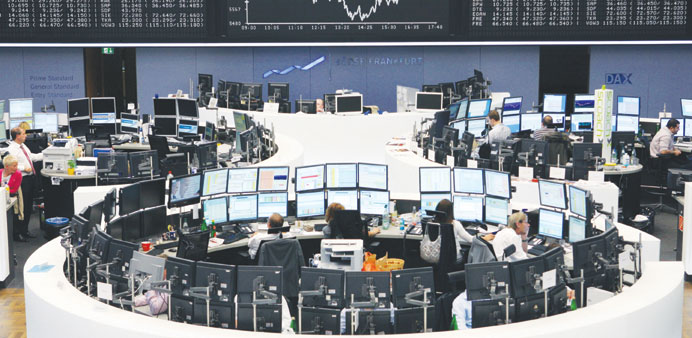|
European equity investors, worried by the threat of deflation, are turning more cautious on companies with high debt levels and preferring luxury and technology stocks to food retailers. |
A dip in eurozone inflation in December has fuelled concerns that the region could be on course for an era of falling prices – traditionally bad news for equities shares as it crimps profits and curbs economic growth.
Not all companies are equally at risk though, opening up some arbitrage opportunities for canny investors.
“Deflation is good for net savers – that means the companies that have less credit, less expansionary balance sheets. The relative play is to be short highly leveraged companies in a deflationary environment,” said Steen Jakobsen, chief economist and CIO at Saxo Bank.
Indeed, a Reuters-created basket of the 142 companies in STOXX Europe 600 who have a debt-to-equity ratio greater than 1 has underperformed in the past week, falling 0.7% compared to a broadly flat showing for the broad index.
As deflation eats into companies’ earnings, it leaves them with less money to meet debt payments. Companies closely involved with assets that could see their prices fall – such as houses – are, in turn, most at risk.
“You want to avoid things like house builders, which are highly leveraged companies, where the value of those assets could fall over a period of time,” said Paul Sedgwick, head of investment at Frank Investments.
“As for the consumer, falling prices are good news for consumers but ... people don’t feel necessarily as rich because the value of their houses and other assets falls.”
In contrast, a similar basket of companies whose debt is equal to less than half their equity has risen 0.5%, outperforming the market after trading in line with it over the past six months, according to Thomson Reuters StarMine data.
Firms whose free cash flow is more than double their dividend commitments have also done well, as investors focus on those able to cope when lower prices result in lower revenues.
The risks are uneven though, with some sectors much better able to keep prices high - through the absence of regulatory pressure and through the presence of willing customers.
“Regulated utilities are a risk. Areas where margins are already being squeezed – and we would point at the food retailers – are at risk as well,” said Peter Sullivan, head of European equity strategy at HSBC.
Food retailers have relatively small margins and high competition, as well as highly vocal clients in the shape of consumers unwilling to overpay for basics such as bread or milk.
On the other side of the coin are luxury goods, whose buyers are often too wealthy to worry about the price, and some companies which offer a unique product, such as some players in the technology sector.
Europe’s luxury firms have added 1.3% in the past week, making it one of the top performing sectors and contrasting with a 1.8% fall in food retailers which have already seen profits hit by heavy Christmas discounting and are likely to be among the first to feel the pressure to cut prices.
One grey area is financials. On paper, their exposure to debt should make them vulnerable to deflation. But they are also likely to be the prime beneficiaries if the threat of falling prices prompts action from the European Central Bank, most likely in the form of some kind of quantitative easing.
“In terms of market implications, it’s tricky. You would expect ... to be very worried about financials, but as the ECB reacts to it then probably the opposite happens,” said Steven Bell, director of global macro at F&C Investments, who is steering clear of European equities due to the complexity of the outlook.
Ibra Wane, senior equity strategist at Amundi, said that a new eruption of financial stress would be the most likely trigger of deflation. This is not his key scenario, but one he is prepared for:
“If this were to happen, the advice that we would give our customers would be to be prepared to reduce aggressively the position of risky assets, to favour cash and – on a second step – if we have to make some arbitrage, we would rather switch back to more defensive, more quality names.”

